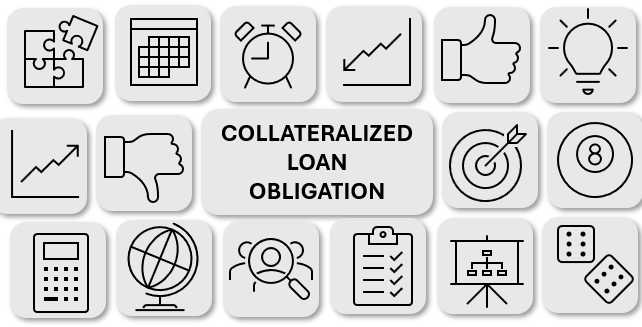Are CLOs Right for Your Portfolio?
Are CLOs Right For Your Portfolio?
During 2023, the Credit Suisse Leveraged Loan Total Return Index (CSLLI) was up 13.0% on a total return basis–according to Bloomberg. This was during a banking crisis, when commercial real estate office buildings were under pressure, and interest rate uncertainty weighed heavy on investors’ collective minds.
At the end of 2023, 85% of the loans in the CSLLI traded above 95 cents on the dollar–compared to roughly 60% at the end of Q4 2022*. That would indicate that leveraged loans are getting closer to ‘priced-to-perfection,’ which would make any contrarian investor nervous, and is worth noting.
Due Diligence and Monitoring is Essential
Managers of Collateralized Loan Obligation (“CLO”) are indicating higher defaults in 2024. which could negatively impact investors’ returns–especially with less credit-worthy CLO funds or if an underlying manager has not been sufficiently researched. Sticking to investment-grade CLOs is likely to benefit investors in the long-term–given the cash-flow stream underlying the CLOs. Capital that is less likely to be downgraded enhances the tactical ability of the CLO to take advantage of market dislocations and deploy capital to buy debt at more attractive prices. However, we have seen CLO managers call capital and deploy money into market pull-backs during the run-up seen in the CSLLI described above.
The knee-jerk reaction might be to withdraw or underweight fixed income in anticipation of a pull-back in the public markets due to rising or flat interest rates, instead of the downward direction of interest rates anticipated by the markets since Q1 2023. We believe the CLO structure is an attractive vehicle for maintaining both upside exposure and downside exposure–but like all investments, due diligence and monitoring is essential.
Manager Selection Plays a Key Role
CLOs are structured investment vehicles that use syndicated debt capital, in addition to equity capital, to purchase a pool of loans as the underlying collateral. Initially, the target underlying collateral is purchased through warehouse financing provided to the CLO issuer. Then, debt capital in tranches, ranging from the most senior then down, is issued. Additionally, equity capital is provided by the CLO issuer. These are used to pay off the warehouse financing.
CLO debt investors are paid down by the principal and interest payments from the underlying loans. CLO equity investors are paid the spread between the income earned by the CLO and the debt service paid by the CLO to its debt holders. While CLO debt holders sit higher in the capital structure and are less likely to see ‘defaults’ by the CLO itself, there are still credit risks to the CLOs that can make an AAA-rated CLO tranche more risky or less risky, depending on the portfolio of loans the CLO has invested in. This is where manager selection plays a key role.
About the CSLLI
The CSLLI tracks the investable markets of the U.S. dollar-denominated leveraged loan market. It consists of issues rated “5B” or lower, meaning that the highest-rated issues included in this index are Moody’s S&P ratings of Baa1/BB+ or Ba1/BBB+. All loans are funded term loans with a tenure of at least one year and are made by issuers domiciled in developed countries. (Source: Morningstar)
*Sources: Canyon Capital Advisors, RJA, Intex, Markit
Are you a Financial Professional? Then check out our new portal and get all kinds of tools and resources on multi-strategy investing, and growth.
IMPORTANT DISCLOSURE:
Securities highlighted or discussed in this blog have been selected to illustrate Validus’s investment approach and/or market outlook and are not intended to represent any strategy or portfolio performance or be an indicator for how strategy or portfolio have performed or may perform in the future. Each security discussed in this blog has been selected solely for this purpose and has not been selected on the basis of performance or any performance-related criteria. The securities discussed herein do not represent an entire portfolio and, in aggregate, may only represent a small percentage of a strategy or portfolio holdings. The strategies and portfolios are actively managed, and securities discussed in this blog may or may not be held in such strategies or portfolios at any given time. These individual securities do not represent all the securities purchased, sold, or recommended and the reader should not assume that investments in the securities identified and discussed were or will be profitable. Nothing in this blog shall constitute a recommendation or endorsement to buy or sell any security or other financial instrument referenced in this letter.
Validus Growth Investors, LLC seeks to invest in companies at every stage of their growth. From startups to publicly traded companies, our research identifies inflection points that have the potential to produce meaningful growth and income for the clients we serve.
Investment Advisory Services are offered through Validus Growth Investors, LLC (“Validus”), an SEC Registered Investment Adviser. No offer is made to buy or sell any security or investment product. This is not a solicitation to invest in any security or any investment product of Validus. Validus does not provide tax or legal advice. Consult with your tax advisor or attorney regarding specific situations. Intended for educational purposes only and not intended as individualized advice or a guarantee that you will achieve a desired result. Opinions expressed are subject to change without notice. Investing involves risk, including the potential loss of principal. No investment can guarantee a profit or protect against loss in periods of declining value. All information is believed to be from reliable sources; however, we make no representation as to its completeness or accuracy. Opinions and projections are as of the date of their first inclusion herein and are subject to change without notice to the reader. As with any analysis of economic and market data, it is important to remember that past performance is no guarantee of future results.


